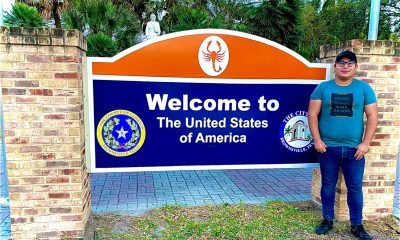homepage news
LGBTI migrants in Tijuana ‘seek opportunity to live’
Thousands of people in the Mexican city hope to enter the US
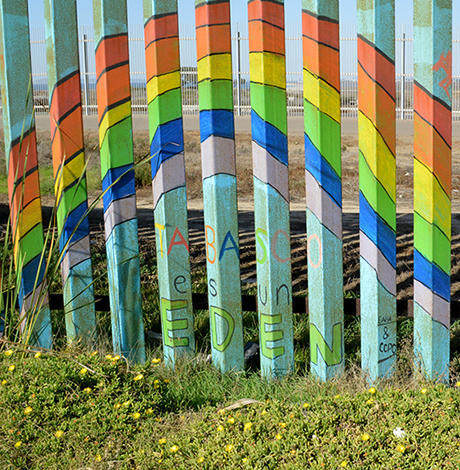
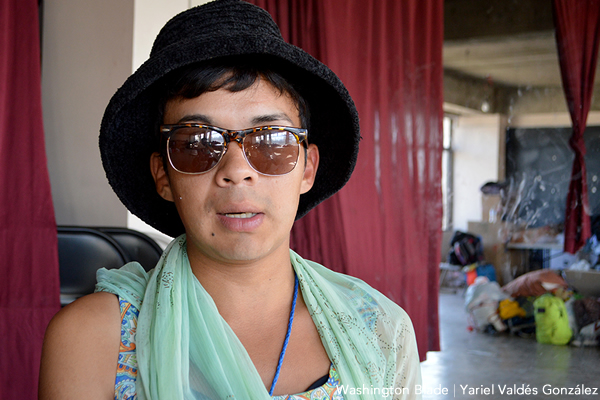
Melani Sofía Rosales Quiñones, a transgender woman from Guatemala City, was beaten, threatened and discriminated against in her country simply because of her gender identity (Washington Blade photo by Yariel Valdés González)
“They hit me with bats and sticks,” Melani now recalls. “They broke my jaw and left jaw bone. I was in a coma in the hospital for three days and 15 days later I had surgery to reconstruct my face. They put in plates and screws. It took me four months to recover.”
A year later the gangs, who are full of hate and violence in Latin America, took over their house and turned it into a stash house. Melani’s mother never accepted this and filed a harassment complaint against the so-called “gangs.”
“They called my mom and threatened her as she was leaving the police station,” says Melani. “They said she can’t play with them and they will kill my younger brother who is 15.”
Melani shared part of her life with the Washington Blade from a guest house in downtown Tijuana where LGBTI members of the migrant caravan who arrived in this border city weeks earlier receive temporary refuge. Melani and other LGBTI migrants in Tijuana all hope to seek asylum in the U.S., a nation in which they think they can live without fear and with economic prosperity.
The LGBTI migrants, like other members of the caravan, are now scattered along Mexico’s northern border. They were a small group that faced abuse and mistreatment while traveling with the caravan itself before arriving in Mexico. Today the LGBTI migrants are nothing more than small and vulnerable groups scattered in Tijuana, Baja California state and Nogales, another border town in Sonora state.
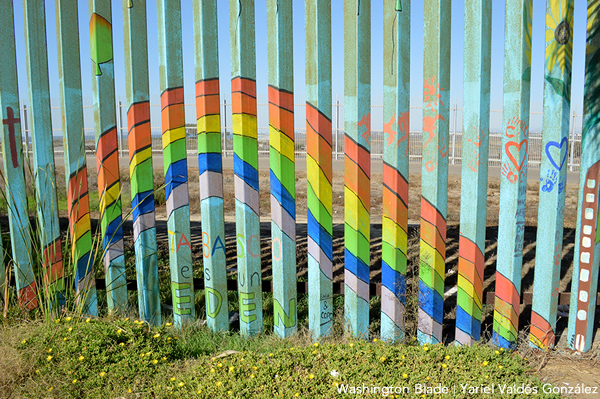
Crossing this wall and safely entering U.S. territory is the dream of the thousands of migrants who are stuck in Tijuana. They are only looking for an opportunity to live in the U.S. (Washington Blade photo by Yariel Valdés González)
Stories behind the American dream
It is not the first time that Melani has launched herself north in order to reach American soil. She “went up” to Tijuana in May of this year with another caravan, but another attack made her think twice. “I was very disappointed because Tijuana officials beat me when I went to the El Chaparral checkpoint,” she says. “I later went to the hospital and filed a complaint against the immigration officers.”
Melani returned to a small town between Guatemala and Mexico she says was “in no man’s land” with the hope that she could once again hit the road and seek the American dream at any moment. She was unable to return to Guatemala or Tijuana. She had almost become a hermit during that time. Melani, an extroverted and sociable girl, was living far away from people.
“I worked in a bakery and from there I went to my house without saying a word, without saying hello to anyone,” she adds.
Melani fled from a Guatemala, where violence is seen as a normal part of life and is worse for members of LGBTI communities. One report on the situation for LGBTI people in four Central American countries says they endure “insults, bribes, arbitrary detentions and physical attacks that often lead to murders, but they do not report them because of fear of reprisals.”
“LGBTI people live in fear and don’t depend on community support networks that help them deal with the violent scenarios in which they live,” reads the report.
The Observatory of Murdered Trans People notes 39 trans women were killed in Guatemala between January and July 2017. Guatemala has the sixth highest rate of trans murders out of any country in Latin America and the Caribbean.
Honduras’ National Commission for Human Rights says 40 LGBTI people have died between 2007 and May of this year. Cattrachas, a lesbian feminist network, indicates 288 LGBTI people have been killed in Honduras between 2009-2018.
Insecurity is not the only situation the Honduran LGBTI community faces. Infobae, an Argentina-based news website, once reported “there is no record of any trans person who has been hired by a private company or a government agency in Honduras.”
Amelia Frank-Vitale, an anthropologist at the University of Michigan who has spent more than a year living in Honduras studying issues related to deportation, migration and violence, confirmed to the Blade “people from the LGBTI community are exposed to all forms of violence that exists against any person in Honduras, which is mainly urban, young and poor.”
“But they are nevertheless discriminated against and stigmatized because of their sexual orientation and in many cases the government is absent on justice-related issues,” she added. “It is always more critical for the LGBTI community.”
It is this situation from which Alexis Rápalos and Solanyi, two identities that live inside the same robust 38-year-old body, fled.
Alexis was wearing a knit hat that covered a nearly shaved head when he spoke with the Blade.
He comes from a family with few resources and he revealed he has suffered the scourge of discrimination in the streets of his city, San Pedro Sula, which for four years was recognized as the world’s most dangerous city, since he was 10. He has lived alone since his mother died a year ago.
A tailor and a chef, he worked in a restaurant in his native country but he decided to join the caravan in search of a future with more security and a life without the harsh realities of rampant homophobia.
He left with nothing more than a pair of pants and a shirt in his backpack and joined the caravan at the Guatemala-Mexico border. “I was discovering friends in the caravan,” says Alexis. “And then the gay community. We came fighting, fighting many things because we are discriminated against, insulted constantly.”
“The road has been very hard,” he adds. “Sometimes we slept in very cold places, with storms. I had the flu with a horrible cough, people gave us medicine, clothes, thank God.”
They reached Tijuana by hitchhiking, and sometimes by bus while depending on charity groups to eat. “We arrived at the shelter that had been at the Benito Juárez Sports Complex, but we were in our own group. They treated us well with clothes, medicine and food,” he said, insisting he is thankful for the assistance he received while there.
Once at the shelter, where unsanitary conditions and overcrowding were a constant, they experienced homophobia that follows some of their fellow travelers and places them in an even worse situation than the rest of the migrants. Alexis says they were booed in food lines and there were times when they were not allowed to eat. The situation repeated itself in the cold outdoor showers where privacy was an unthinkable luxury.
He felt the harshness of the early morning cold while he and roughly 6,000 Central Americans were staying at the shelter that city officials set up. Alexis slept in the street because he didn’t have a tent to protect himself. The unusually heavy seasonal rains that soaked his meager belongings chilled him to the bone.
“In the (Benito Juárez) shelter we saw humiliations, criticisms and they even made us take down our gay flag,” says Bairon Paolo González Morena, a 27-year-old gay man from Guatemala. “We were discriminated against a lot. They told us we could not make the same line for food and they made us stand at the end of the line for the bathroom and here (at Enclave Caracol, a new shelter) they are treating us much better. They gave us our place. We have a separate bathroom and everything.”
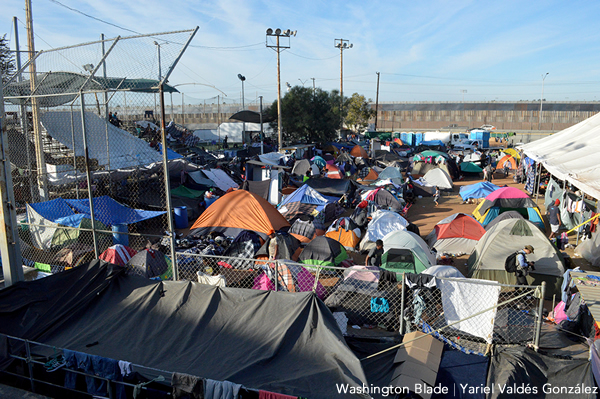
LGBTI members of the caravan that arrived in Tijuana were housed at the Benito Juárez Sports Complex that had been converted into a shelter. They were discriminated against by their fellow migrants. The LGBTI migrants were forced to take down their gay flag. They were also not allowed into food lines and were the last ones to use public showers. (Washington Blade photo by Yariel Valdés González)
Bairon was a cross-dresser known as Kaira Paola at night and was a sex worker, which left him with many scars on his body. “I worked to provide food for my twin brother and younger brother,” he says. “My family there found out that I was gay. My stepmother discriminated against me and my dad did not support me and until this day I am fighting for my well-being.”
He lived alone and decided to join the caravan because he was constantly extorted for money. He was already working in a restaurant in Tuxpan in Veracruz state when the migrants reached Mexico, and he didn’t think twice about joining the caravan that Frank-Vitale says is “a civil disobedience movement against a global regime.”
“The caravan is the form that has been recognized as the way one can cross Mexico without being as exposed to criminal groups, corrupt authorities and without paying a smuggler to seek an opportunity to live,” she says.
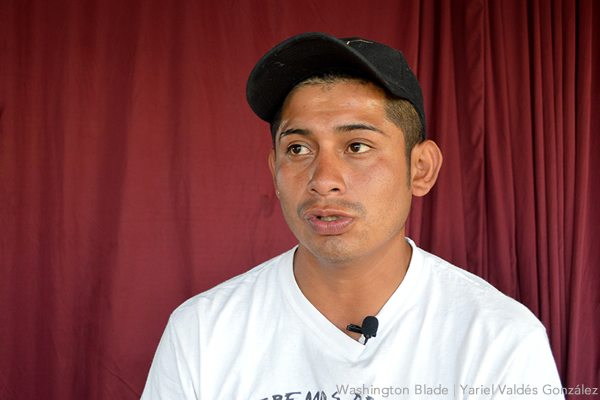
Paolo González Morena, a 27-year-old gay man from Guatemala, was a sex worker in his country and was constantly extorted and mistreated because of his sexual orientation. (Washington Blade photo by Yariel Valdés González)
Waiting for asylum
A long line has formed outside Enclave Caracol, a community center located on First Street in downtown Tijuana that has welcomed this portion of the LGBTI caravan that arrived weeks after the first.
Under tents, the migrants organize themselves to distribute food they prepared themselves inside the building in which a wedding for several gay couples took place weeks earlier.
Nacho, who asked the Blade only to use his first name, works for Enclave Caracol. He said (he and his colleagues) are supporting “the community with food and water, (allowing them to) use the bathroom, Internet access, use of telephones that allows them to call practically any part of the world and at some moments it has functioned as a shelter.”
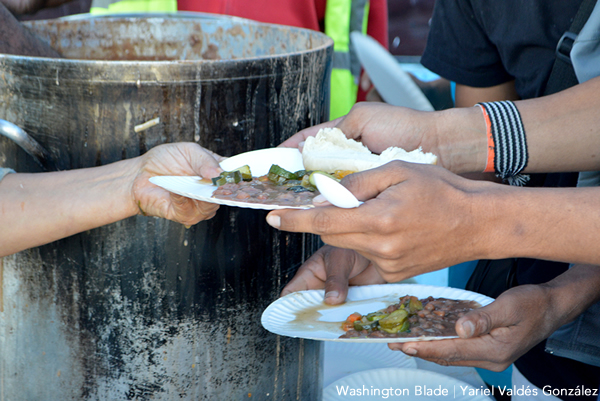
At same migrants who receive services at Enclave Caracol have cooked and organized their lives there. Donations from members of civil society in various cities have made it possible for Enclave Caracol to provide assistance to the dozens of migrants who are taking shelter there. (Washington Blade photo by Yariel Valdés González)
Enclave Caracol’s employees were the ones who cooked most of the food and did the cleaning when the center first provided aid to these displaced people. But Nacho says “people from the caravan have been getting involved bit by bit.”
“No one from Enclave has actually ever been in the kitchen,” he tells the Blade. “Over the last few weeks we have received donations and we have also been going to the markets for leftover fruits and vegetables and we clean them, process them and they’re cooked. They are organizing the cleaning and delivery of food themselves.”
Nacho said many civil society members in Los Angeles, San Diego and in Tijuana itself are donating money, food, cleaning products, disposable plates and cups to alleviate the tense situation that exists with the arrival of thousands of migrants, many of whom have not begun the political asylum process, to this urban border city. These civil society members are also volunteering their time.
“There is a very long list of people who are seeking asylum, who have been brought to the port of entry and are looking to following the correct process under international law,” says Frank-Vitale, noting the U.S. asylum process has been made intentionally difficult. “It has been said that they are going to have to wait up to two months to have the opportunity to make their case and this is truly a deadly humanitarian crisis for vulnerable people who have fled persecution, who live in the rain, the cold, outside all this time.”
“Sometimes one becomes hopeless because there is no stable place,” says Alexis, who remains hopeful. “We are going from here to there. They say that today they are going to bring us to another house to wait for lawyers who are going to help us with our papers.”
Melani is nevertheless more realistic when speaking about her asylum claim. “Our situation is a bit difficult because many people continue to arrive,” she says. “Donald Trump closed the border and the crossing is very complicated. This is why people who are going to the border are under stress.”
Frank-Vitale thinks the actual asylum system should be changed in order to recognize modern forms of violence and persecution to which people are exposed and especially LGBTI groups. “Taking all of this into account, yes, it is possible,” she says. “There are cases from Central America that perfectly enter the system, always and when they have a founded fear of their lives in their countries and many people have a very real fear.”
This fear, which has been with Melani for most of her life, will follow her to the U.S., because in “the previous caravan there was a girl named Roxana (Hernández) who died because she had HIV, but the autopsy revealed that she had been beaten by U.S. Immigration and Customs Enforcement (ICE) officials.”
The original autopsy performed on Hernández, a trans Honduran woman with HIV who died in ICE custody in New Mexico on May 25, lists the cause of death as cardiac arrest. The second autopsy to which Melani referred shows Hernández was beaten, but does not identify who attacked her while she was in custody.
Hernández’s case has reached the U.S. Senate with three senators recently asking U.S. Customs and Border Protection to provide them with documents relating to her death.
In spite of all of these situations, in spite of a xenophobic president who commands the other side of the border, in spite of a powerful army positioned on the border, in spite of the long lines to be heard, in spite of the constant uncertainty, Bairon remains firm in his decision: “We are here. With everything we have given up, I will not return.”
We already know why.
homepage news
Honoring the legacy of New Orleans’ 1973 UpStairs Lounge fire
Why the arson attack that killed 32 gay men still resonates 50 years later

On June 23 of last year, I held the microphone as a gay man in the New Orleans City Council Chamber and related a lost piece of queer history to the seven council members. I told this story to disabuse all New Orleanians of the notion that silence and accommodation, in the face of institutional and official failures, are a path to healing.
The story I related to them began on a typical Sunday night at a second-story bar on the fringe of New Orleans’ French Quarter in 1973, where working-class men would gather around a white baby grand piano and belt out the lyrics to a song that was the anthem of their hidden community, “United We Stand” by the Brotherhood of Man.
“United we stand,” the men would sing together, “divided we fall” — the words epitomizing the ethos of their beloved UpStairs Lounge bar, an egalitarian free space that served as a forerunner to today’s queer safe havens.
Around that piano in the 1970s Deep South, gays and lesbians, white and Black queens, Christians and non-Christians, and even early gender minorities could cast aside the racism, sexism, and homophobia of the times to find acceptance and companionship for a moment.
For regulars, the UpStairs Lounge was a miracle, a small pocket of acceptance in a broader world where their very identities were illegal.
On the Sunday night of June 24, 1973, their voices were silenced in a murderous act of arson that claimed 32 lives and still stands as the deadliest fire in New Orleans history — and the worst mass killing of gays in 20th century America.
As 13 fire companies struggled to douse the inferno, police refused to question the chief suspect, even though gay witnesses identified and brought the soot-covered man to officers idly standing by. This suspect, an internally conflicted gay-for-pay sex worker named Rodger Dale Nunez, had been ejected from the UpStairs Lounge screaming the word “burn” minutes before, but New Orleans police rebuffed the testimony of fire survivors on the street and allowed Nunez to disappear.
As the fire raged, police denigrated the deceased to reporters on the street: “Some thieves hung out there, and you know this was a queer bar.”
For days afterward, the carnage met with official silence. With no local gay political leaders willing to step forward, national Gay Liberation-era figures like Rev. Troy Perry of the Metropolitan Community Church flew in to “help our bereaved brothers and sisters” — and shatter officialdom’s code of silence.
Perry broke local taboos by holding a press conference as an openly gay man. “It’s high time that you people, in New Orleans, Louisiana, got the message and joined the rest of the Union,” Perry said.
Two days later, on June 26, 1973, as families hesitated to step forward to identify their kin in the morgue, UpStairs Lounge owner Phil Esteve stood in his badly charred bar, the air still foul with death. He rebuffed attempts by Perry to turn the fire into a call for visibility and progress for homosexuals.
“This fire had very little to do with the gay movement or with anything gay,” Esteve told a reporter from The Philadelphia Inquirer. “I do not want my bar or this tragedy to be used to further any of their causes.”
Conspicuously, no photos of Esteve appeared in coverage of the UpStairs Lounge fire or its aftermath — and the bar owner also remained silent as he witnessed police looting the ashes of his business.
“Phil said the cash register, juke box, cigarette machine and some wallets had money removed,” recounted Esteve’s friend Bob McAnear, a former U.S. Customs officer. “Phil wouldn’t report it because, if he did, police would never allow him to operate a bar in New Orleans again.”
The next day, gay bar owners, incensed at declining gay bar traffic amid an atmosphere of anxiety, confronted Perry at a clandestine meeting. “How dare you hold your damn news conferences!” one business owner shouted.
Ignoring calls for gay self-censorship, Perry held a 250-person memorial for the fire victims the following Sunday, July 1, culminating in mourners defiantly marching out the front door of a French Quarter church into waiting news cameras. “Reverend Troy Perry awoke several sleeping giants, me being one of them,” recalled Charlene Schneider, a lesbian activist who walked out of that front door with Perry.

Esteve doubted the UpStairs Lounge story’s capacity to rouse gay political fervor. As the coroner buried four of his former patrons anonymously on the edge of town, Esteve quietly collected at least $25,000 in fire insurance proceeds. Less than a year later, he used the money to open another gay bar called the Post Office, where patrons of the UpStairs Lounge — some with visible burn scars — gathered but were discouraged from singing “United We Stand.”
New Orleans cops neglected to question the chief arson suspect and closed the investigation without answers in late August 1973. Gay elites in the city’s power structure began gaslighting the mourners who marched with Perry into the news cameras, casting suspicion on their memories and re-characterizing their moment of liberation as a stunt.
When a local gay journalist asked in April 1977, “Where are the gay activists in New Orleans?,” Esteve responded that there were none, because none were needed. “We don’t feel we’re discriminated against,” Esteve said. “New Orleans gays are different from gays anywhere else… Perhaps there is some correlation between the amount of gay activism in other cities and the degree of police harassment.”

An attitude of nihilism and disavowal descended upon the memory of the UpStairs Lounge victims, goaded by Esteve and fellow gay entrepreneurs who earned their keep via gay patrons drowning their sorrows each night instead of protesting the injustices that kept them drinking.
Into the 1980s, the story of the UpStairs Lounge all but vanished from conversation — with the exception of a few sanctuaries for gay political debate such as the local lesbian bar Charlene’s, run by the activist Charlene Schneider.
By 1988, the 15th anniversary of the fire, the UpStairs Lounge narrative comprised little more than a call for better fire codes and indoor sprinklers. UpStairs Lounge survivor Stewart Butler summed it up: “A tragedy that, as far as I know, no good came of.”
Finally, in 1991, at Stewart Butler and Charlene Schneider’s nudging, the UpStairs Lounge story became aligned with the crusade of liberated gays and lesbians seeking equal rights in Louisiana. The halls of power responded with intermittent progress. The New Orleans City Council, horrified by the story but not yet ready to take its look in the mirror, enacted an anti-discrimination ordinance protecting gays and lesbians in housing, employment, and public accommodations that Dec. 12 — more than 18 years after the fire.
“I believe the fire was the catalyst for the anger to bring us all to the table,” Schneider told The Times-Picayune, a tacit rebuke to Esteve’s strategy of silent accommodation. Even Esteve seemed to change his stance with time, granting a full interview with the first UpStairs Lounge scholar Johnny Townsend sometime around 1989.
Most of the figures in this historic tale are now deceased. What’s left is an enduring story that refused to go gently. The story now echoes around the world — a musical about the UpStairs Lounge fire recently played in Tokyo, translating the gay underworld of the 1973 French Quarter for Japanese audiences.
When I finished my presentation to the City Council last June, I looked up to see the seven council members in tears. Unanimously, they approved a resolution acknowledging the historic failures of city leaders in the wake of the UpStairs Lounge fire.
Council members personally apologized to UpStairs Lounge families and survivors seated in the chamber in a symbolic act that, though it could not bring back those who died, still mattered greatly to those whose pain had been denied, leaving them to grieve alone. At long last, official silence and indifference gave way to heartfelt words of healing.
The way Americans remember the past is an active, ongoing process. Our collective memory is malleable, but it matters because it speaks volumes about our maturity as a people, how we acknowledge the past’s influence in our lives, and how it shapes the examples we set for our youth. Do we grapple with difficult truths, or do we duck accountability by defaulting to nostalgia and bluster? Or worse, do we simply ignore the past until it fades into a black hole of ignorance and indifference?
I believe that a factual retelling of the UpStairs Lounge tragedy — and how, 50 years onward, it became known internationally — resonates beyond our current divides. It reminds queer and non-queer Americans that ignoring the past holds back the present, and that silence is no cure for what ails a participatory nation.
Silence isolates. Silence gaslights and shrouds. It preserves the power structures that scapegoat the disempowered.
Solidarity, on the other hand, unites. Solidarity illuminates a path forward together. Above all, solidarity transforms the downtrodden into a resounding chorus of citizens — in the spirit of voices who once gathered ‘round a white baby grand piano and sang, joyfully and loudly, “United We Stand.”

Robert W. Fieseler is a New Orleans-based journalist and the author of “Tinderbox: the Untold Story of the Up Stairs Lounge Fire and the Rise of Gay Liberation.”
homepage news
New Supreme Court term includes critical LGBTQ case with ‘terrifying’ consequences
Business owner seeks to decline services for same-sex weddings

The U.S. Supreme Court, after a decision overturning Roe v. Wade that still leaves many reeling, is starting a new term with justices slated to revisit the issue of LGBTQ rights.
In 303 Creative v. Elenis, the court will return to the issue of whether or not providers of custom-made goods can refuse service to LGBTQ customers on First Amendment grounds. In this case, the business owner is Lorie Smith, a website designer in Colorado who wants to opt out of providing her graphic design services for same-sex weddings despite the civil rights law in her state.
Jennifer Pizer, acting chief legal officer of Lambda Legal, said in an interview with the Blade, “it’s not too much to say an immeasurably huge amount is at stake” for LGBTQ people depending on the outcome of the case.
“This contrived idea that making custom goods, or offering a custom service, somehow tacitly conveys an endorsement of the person — if that were to be accepted, that would be a profound change in the law,” Pizer said. “And the stakes are very high because there are no practical, obvious, principled ways to limit that kind of an exception, and if the law isn’t clear in this regard, then the people who are at risk of experiencing discrimination have no security, no effective protection by having a non-discrimination laws, because at any moment, as one makes their way through the commercial marketplace, you don’t know whether a particular business person is going to refuse to serve you.”
The upcoming arguments and decision in the 303 Creative case mark a return to LGBTQ rights for the Supreme Court, which had no lawsuit to directly address the issue in its previous term, although many argued the Dobbs decision put LGBTQ rights in peril and threatened access to abortion for LGBTQ people.
And yet, the 303 Creative case is similar to other cases the Supreme Court has previously heard on the providers of services seeking the right to deny services based on First Amendment grounds, such as Masterpiece Cakeshop and Fulton v. City of Philadelphia. In both of those cases, however, the court issued narrow rulings on the facts of litigation, declining to issue sweeping rulings either upholding non-discrimination principles or First Amendment exemptions.
Pizer, who signed one of the friend-of-the-court briefs in opposition to 303 Creative, said the case is “similar in the goals” of the Masterpiece Cakeshop litigation on the basis they both seek exemptions to the same non-discrimination law that governs their business, the Colorado Anti-Discrimination Act, or CADA, and seek “to further the social and political argument that they should be free to refuse same-sex couples or LGBTQ people in particular.”
“So there’s the legal goal, and it connects to the social and political goals and in that sense, it’s the same as Masterpiece,” Pizer said. “And so there are multiple problems with it again, as a legal matter, but also as a social matter, because as with the religion argument, it flows from the idea that having something to do with us is endorsing us.”
One difference: the Masterpiece Cakeshop litigation stemmed from an act of refusal of service after owner, Jack Phillips, declined to make a custom-made wedding cake for a same-sex couple for their upcoming wedding. No act of discrimination in the past, however, is present in the 303 Creative case. The owner seeks to put on her website a disclaimer she won’t provide services for same-sex weddings, signaling an intent to discriminate against same-sex couples rather than having done so.
As such, expect issues of standing — whether or not either party is personally aggrieved and able bring to a lawsuit — to be hashed out in arguments as well as whether the litigation is ripe for review as justices consider the case. It’s not hard to see U.S. Chief Justice John Roberts, who has sought to lead the court to reach less sweeping decisions (sometimes successfully, and sometimes in the Dobbs case not successfully) to push for a decision along these lines.
Another key difference: The 303 Creative case hinges on the argument of freedom of speech as opposed to the two-fold argument of freedom of speech and freedom of religious exercise in the Masterpiece Cakeshop litigation. Although 303 Creative requested in its petition to the Supreme Court review of both issues of speech and religion, justices elected only to take up the issue of free speech in granting a writ of certiorari (or agreement to take up a case). Justices also declined to accept another question in the petition request of review of the 1990 precedent in Smith v. Employment Division, which concluded states can enforce neutral generally applicable laws on citizens with religious objections without violating the First Amendment.
Representing 303 Creative in the lawsuit is Alliance Defending Freedom, a law firm that has sought to undermine civil rights laws for LGBTQ people with litigation seeking exemptions based on the First Amendment, such as the Masterpiece Cakeshop case.
Kristen Waggoner, president of Alliance Defending Freedom, wrote in a Sept. 12 legal brief signed by her and other attorneys that a decision in favor of 303 Creative boils down to a clear-cut violation of the First Amendment.
“Colorado and the United States still contend that CADA only regulates sales transactions,” the brief says. “But their cases do not apply because they involve non-expressive activities: selling BBQ, firing employees, restricting school attendance, limiting club memberships, and providing room access. Colorado’s own cases agree that the government may not use public-accommodation laws to affect a commercial actor’s speech.”
Pizer, however, pushed back strongly on the idea a decision in favor of 303 Creative would be as focused as Alliance Defending Freedom purports it would be, arguing it could open the door to widespread discrimination against LGBTQ people.
“One way to put it is art tends to be in the eye of the beholder,” Pizer said. “Is something of a craft, or is it art? I feel like I’m channeling Lily Tomlin. Remember ‘soup and art’? We have had an understanding that whether something is beautiful or not is not the determining factor about whether something is protected as artistic expression. There’s a legal test that recognizes if this is speech, whose speech is it, whose message is it? Would anyone who was hearing the speech or seeing the message understand it to be the message of the customer or of the merchants or craftsmen or business person?”
Despite the implications in the case for LGBTQ rights, 303 Creative may have supporters among LGBTQ people who consider themselves proponents of free speech.
One joint friend-of-the-court brief before the Supreme Court, written by Dale Carpenter, a law professor at Southern Methodist University who’s written in favor of LGBTQ rights, and Eugene Volokh, a First Amendment legal scholar at the University of California, Los Angeles, argues the case is an opportunity to affirm the First Amendment applies to goods and services that are uniquely expressive.
“Distinguishing expressive from non-expressive products in some contexts might be hard, but the Tenth Circuit agreed that Smith’s product does not present a hard case,” the brief says. “Yet that court (and Colorado) declined to recognize any exemption for products constituting speech. The Tenth Circuit has effectively recognized a state interest in subjecting the creation of speech itself to antidiscrimination laws.”
Oral arguments in the case aren’t yet set, but may be announced soon. Set to defend the state of Colorado and enforcement of its non-discrimination law in the case is Colorado Solicitor General Eric Reuel Olson. Just this week, the U.S. Supreme Court announced it would grant the request to the U.S. solicitor general to present arguments before the justices on behalf of the Biden administration.
With a 6-3 conservative majority on the court that has recently scrapped the super-precedent guaranteeing the right to abortion, supporters of LGBTQ rights may think the outcome of the case is all but lost, especially amid widespread fears same-sex marriage would be next on the chopping block. After the U.S. Tenth Circuit Court of Appeals ruled against 303 Creative in the lawsuit, the simple action by the Supreme Court to grant review in the lawsuit suggests they are primed to issue a reversal and rule in favor of the company.
Pizer, acknowledging the call to action issued by LGBTQ groups in the aftermath of the Dobbs decision, conceded the current Supreme Court issuing the ruling in this case is “a terrifying prospect,” but cautioned the issue isn’t so much the makeup of the court but whether or not justices will continue down the path of abolishing case law.
“I think the question that we’re facing with respect to all of the cases or at least many of the cases that are in front of the court right now, is whether this court is going to continue on this radical sort of wrecking ball to the edifice of settled law and seemingly a goal of setting up whole new structures of what our basic legal principles are going to be. Are we going to have another term of that?” Pizer said. “And if so, that’s terrifying.”
homepage news
Kelley Robinson, a Black, queer woman, named president of Human Rights Campaign
Progressive activist a veteran of Planned Parenthood Action Fund

Kelley Robinson, a Black, queer woman and veteran of Planned Parenthood Action Fund, is to become the next president of the Human Rights Campaign, the nation’s leading LGBTQ group announced on Tuesday.
Robinson is set to become the ninth president of the Human Rights Campaign after having served as executive director of Planned Parenthood Action Fund and more than 12 years of experience as a leader in the progressive movement. She’ll be the first Black, queer woman to serve in that role.
“I’m honored and ready to lead HRC — and our more than three million member-advocates — as we continue working to achieve equality and liberation for all Lesbian, Gay, Bisexual, Transgender, and Queer people,” Robinson said. “This is a pivotal moment in our movement for equality for LGBTQ+ people. We, particularly our trans and BIPOC communities, are quite literally in the fight for our lives and facing unprecedented threats that seek to destroy us.”
The next Human Rights Campaign president is named as Democrats are performing well in polls in the mid-term elections after the U.S. Supreme Court overturned Roe v. Wade, leaving an opening for the LGBTQ group to play a key role amid fears LGBTQ rights are next on the chopping block.
“The overturning of Roe v. Wade reminds us we are just one Supreme Court decision away from losing fundamental freedoms including the freedom to marry, voting rights, and privacy,” Robinson said. “We are facing a generational opportunity to rise to these challenges and create real, sustainable change. I believe that working together this change is possible right now. This next chapter of the Human Rights Campaign is about getting to freedom and liberation without any exceptions — and today I am making a promise and commitment to carry this work forward.”
The Human Rights Campaign announces its next president after a nearly year-long search process after the board of directors terminated its former president Alphonso David when he was ensnared in the sexual misconduct scandal that led former New York Gov. Andrew Cuomo to resign. David has denied wrongdoing and filed a lawsuit against the LGBTQ group alleging racial discrimination.

-

 District of Columbia3 days ago
District of Columbia3 days agoCatching up with the asexuals and aromantics of D.C.
-

 State Department5 days ago
State Department5 days agoState Department releases annual human rights report
-

 South America3 days ago
South America3 days agoArgentina government dismisses transgender public sector employees
-

 Maine4 days ago
Maine4 days agoMaine governor signs transgender, abortion sanctuary bill into law



